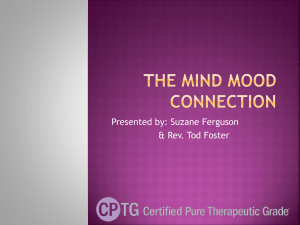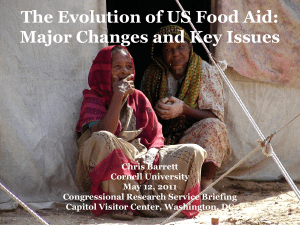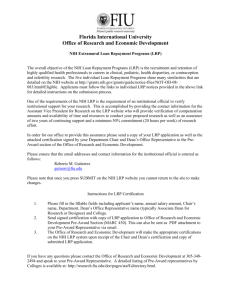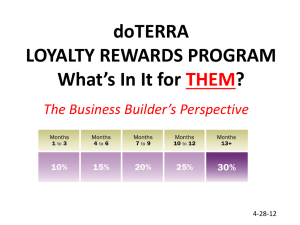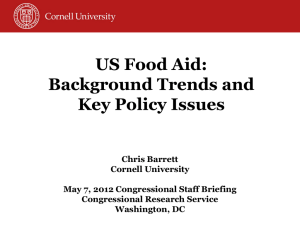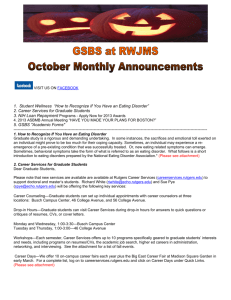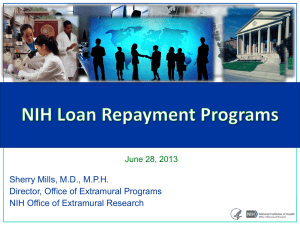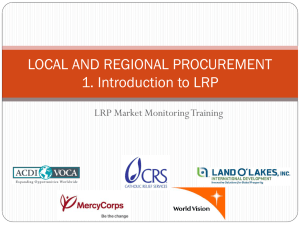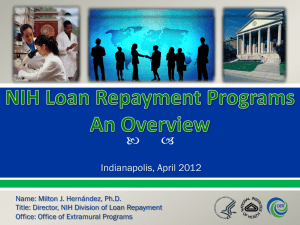Leadership for Results Programme
advertisement
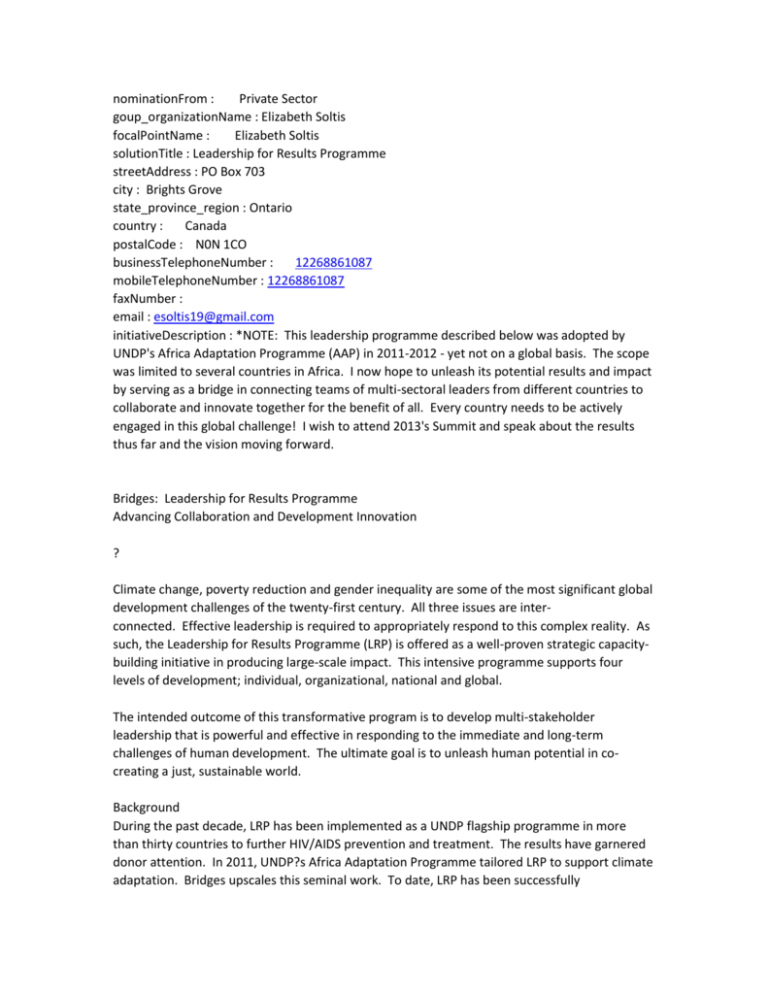
nominationFrom : Private Sector goup_organizationName : Elizabeth Soltis focalPointName : Elizabeth Soltis solutionTitle : Leadership for Results Programme streetAddress : PO Box 703 city : Brights Grove state_province_region : Ontario country : Canada postalCode : N0N 1CO businessTelephoneNumber : 12268861087 mobileTelephoneNumber : 12268861087 faxNumber : email : esoltis19@gmail.com initiativeDescription : *NOTE: This leadership programme described below was adopted by UNDP's Africa Adaptation Programme (AAP) in 2011-2012 - yet not on a global basis. The scope was limited to several countries in Africa. I now hope to unleash its potential results and impact by serving as a bridge in connecting teams of multi-sectoral leaders from different countries to collaborate and innovate together for the benefit of all. Every country needs to be actively engaged in this global challenge! I wish to attend 2013's Summit and speak about the results thus far and the vision moving forward. Bridges: Leadership for Results Programme Advancing Collaboration and Development Innovation ? Climate change, poverty reduction and gender inequality are some of the most significant global development challenges of the twenty-first century. All three issues are interconnected. Effective leadership is required to appropriately respond to this complex reality. As such, the Leadership for Results Programme (LRP) is offered as a well-proven strategic capacitybuilding initiative in producing large-scale impact. This intensive programme supports four levels of development; individual, organizational, national and global. The intended outcome of this transformative program is to develop multi-stakeholder leadership that is powerful and effective in responding to the immediate and long-term challenges of human development. The ultimate goal is to unleash human potential in cocreating a just, sustainable world. Background During the past decade, LRP has been implemented as a UNDP flagship programme in more than thirty countries to further HIV/AIDS prevention and treatment. The results have garnered donor attention. In 2011, UNDP?s Africa Adaptation Programme tailored LRP to support climate adaptation. Bridges upscales this seminal work. To date, LRP has been successfully implemented in Ghana, Congo (ROC) and Ethiopia with over 175 leaders and 30 breakthrough projects now being executed. Inquire about results and success stories. Bridges involves three key objectives: i) to empower multi-sectoral leaders to be skilled, effective and resilient as development practitioners ii) to evolve organizations to be efficient, adaptable and relevant in dealing with complex issues iii) to create communities of commitment for leaders to collaboratively partner on innovation projects Emerging from this community is a new ?3R+3H partnership paradigm?? ? partnerships based on Respect, Reciprocity and Re-imagining equality ? engaging people with their Heads, Hearts and Hands LRP inspires people into action with a personally meaningful vision. Leaders then practice a different way of speaking, listening and behaving in their organizations to catalyze teams in achieving real results. In the living laboratory of innovation projects, leaders access the courage to shift systems that are no longer viable. Learning journeys connect leaders face-to-face from different cultures to share wisdom, technology, resources and best practices. A global network of leaders draws on their creative intelligence to develop new proto-types. Together in partnership, they go beyond business as usual in bridging the micro level to macro results. Audience Approximately 50-70 mid-level managers participate in each of the three one-week workshops, scheduled over six months. The group totals 4-6 participants from 12-15 organizations. Multiple sectors are represented; government, academia, private sector, media, arts, civil society and the UN. Gender balance is underscored. Possible Breakthrough Project Result Areas * Water and forest protection * Agriculture and food security Violence * Renewable energy * Poverty Reduction * Waste management * Decrease of Gender Contact: Elizabeth Soltis, Transformative Leadership Facilitator, esoltis19@gmail.com ?We cannot solve problems by using the same kind of thinking we used when we created them.? Einstein mainPartners : As the Senior Consultant for the AAP Leadership for Results Programme (LRP) in 2011-2012, I was responsible for enrolling UNDP country office teams along with government partners for a jointly sponsored programme. The countries I visited to begin this process include Ethiopia, Ghana, Congo (DRC), Morocco, Namibia and Lesotho. Of these countries, only the first 3 were in a place of readiness to adopt this critical leadership capacity-building initiative. Typically the Ministry of Environment was engaged, along with UNDP's E&E team in owning the programme's implementation process. I worked with these task teams in deciding on roles, responsibilities, result areas, milestones, timeframes and resource allocation. All these documents can be provided upon request. Together, we embarked on an 8 month journey in executing this vision in order to achieve extraordinary results in the areas of climate change adaptation. Due to their ownership of LRP, most of the teams breakthrough projects are still underway in each country. They are now providing support, in various forms, to project teams to upscale their efforts and contribute to greater results. achievementsAndImpact : Some of the LRP breakthrough project results include; * an NGO team in Ghana securing 75,000 fuel efficient wood burning stoves to distribute to a village in the vulnerable north + educating the community about climate change + engaging them in re-forestation efforts. * a private bank called EcoBank in Ghana is working in partnership with a village to adopt a river to rehabilitate - taking their corporate social responsibility to another level * a media team has adopted a community in a behavior-change program to educate the citizens about climate change and to work with them on health care and hygene issues. * the Disaster Risk Reduction Ministry in Ghana has partnered with a vulnerable community which experiences annual flooding - together they are co-creating a flood pole warning system. Long-term they are working to re-locate this village to higher ground due to the effects of climate change. * the Ministry of Transportation in Ethiopia is investing in a new infrastructure program in building new roads and railways that are climate resilient - enabling them to transport food stuffs more effectively, given the challenges of climate effects * an NGO in Ethiopia has begun a revenue generation process in implementing a 1% payroll green tax to raise millions of US dollars for climate change adaptation programs in the rural countryside * the Ministry of Industry in Ethiopia is now actively reaching out to corporations in providing consulting and training support to help green the private sector - reducing their carbon footprint and re-tooling businesses for greater profitability Quantitative and qualitative reports can be provided upon request.... sustainability : Of the 23 LRP breakthrough projects still underway, all are dedicated to capacity-building and empowerment in some way - directly or indirectly. Given that this is a leadership development programme, the intention is to inspire and empower multi-sectoral leaders to deepen their commitment as environmental stewards. This hands-on learning experience, in essence, is about empowerment. It was framed as "leadership in action". In Ethiopia, a group of elected government officials (Parliamentarians) have initiated new legislation on revamping the climate change adaptation policy. In the case of the Ethiopian Ministry of Energy and Natural Resources, their project was dedicated to upgrading renewal resource policy. The positive ripple effect of all these projects ultimately cannot be measured. The goal was to catalyze a new network of conversations in various organizations around effective climate change action - awakening people to new possibilities and their coresponsibility in manifesting results. innovation : The criteria for LRP breakthrough projects was to go beyond business as usual in producing extraordinary results in the areas of water and forest protection, renewal energy, garbage/pollution, disaster risk management and/or food security and agriculture and land ownership. Here are some examples of the project team commitment statements that generated action and results in the months that followed; Environmental Protection Agency: Within the next three years, we commit to expanding climate change awareness with all citizens of Ethiopia in order to mobilize greater participatory involvement, identify champions for responsible action and proactively prevent crisis. We intend to partner with multi-sectoral groups to catalyze action plans that result in community initiatives that effectively address the effects of climate change. Success Indicators: New EPA multi-sectoral partnerships to include; o two media houses and religious institutions o environmental school clubs existing in each district o all government ministries and regional bureaus o all environmental NGOs and creative arts associations o the private sector via MOI & Chamber of Commerce ? Percentage of people actively engaged with community groups ? Number of viable climate resiliency action plans that are actually being implemented at the community level ? Number and quality of effective workshops for partners, with specific learning objectives tailored to the sector and group ? In three years, measure pre/post results in public outreach, awareness of climate change issues and overall population resiliency Ethiopian Ministry of Women, Children and Youth: We commit to partnering with local organisations by providing an effective capacity development reforestation livelihood programme that will not only sustainably protect the environment, but also enable women and youth to become economically self-sufficient. By focusing on one pilot region, we intend to reduce migration and its negative social impact. With new sources of funding and new multi-sectoral leadership engagement, we will support 75,000 women fuel wood carriers and vulnerable youth in leading empowered lives. Success Indicators: ? In October 2011, an area of operation for the pilot will be selected. ? The development of a funding strategy. ? The identification and mapping of key CC multi-sectoral stakeholders to engage as committed partners in an ongoing collaboration process. ? The completion of a community needs assessment to identify the target population?s needs, priorities, challenges, strengths and requests for support. ? The establishment of key baseline data and migratory patterns from which to measure success. ? The identification of support institutions to draw effective trainers - plus the completion of TORs. ? An effective, relevant Train-the-Trainer (TOT) capacity programme to support the key needs expressed by women/youth in the community. ? New empowering attitudes, behaviours and sustainable alternative livelihoods that will result from the TOT via pre/post evaluation matrix. ? By March 2012, to secure the required resources, successfully engage key stakeholders and to co-create a strategic plan. ? Within the next three years, ownership, capacity and resources will be transferred to the regional bureau in fully managing this project with potential scale-up. Ghana National Development Planning Commission: We commit to developing a sustainable mechanism within NDPC to ensure climate change adaptation indicators are included in district development plans. Once gaps are identified in the plans, training and follow-up coaching will be provided to capacitate planning partners so that effective action will be taken to close the gaps. The goal is to achieve greater concrete results at the district level and ensure that this learning informs future national climate change policies. Success Indicators: ? Developed a CC checklist to successfully review the targeted 60 district medium-term development plans based on the Ghana Shared Growth and Dev. Agenda 2010-2013 ? Generated a recommendations report for CC adaptation action based on findings ? Now planning CC capacity development training for district stakeholders Projected Long-Term Impact: All 60 district development plans will incorporate CC adaptation action measures so CC will be perceived as a priority development goal. Our vision is to ultimately ensure that all 170 districts have followed this course of action. Ghana's Abantu (NGO Research Think Tank): We commit to increasing women?s access to water to better enable them to dedicate time to other life-enhancing pursuits. We will do this by partnering with one rural community to complete a rainwater harvesting pilot project by end of March 2012. We envision the benefits will be in the areas of health, political involvement, entrepreneurship, community leadership and ownership of needs. Success Indicators: ? ? ? ? ? ? ? Completed a desk study for the project Collected CC information from GMET and analyzed Conducted newspaper reviews and internet searches related to project Enrolled community leaders in vision Developed project proposals and circulated to key partners Carried out sensitization sessions with partners re: CC and gender issues Collected baseline data from Wantaugu, Wirja Fise, Assin Fosu regions Projected Long-Term Impact: By completing the installation of a community rainwater harvesting system in one drought/flood-prone community, we will demonstrate impact on the quality of women?s lives. We intend to upscale this success story to other communities. NOTE: This type of information can be provided for all 23 LRP projects. replicabilityAndScalingUp : These LRP results can indeed be scaled up - both on a project basis as well as implementing the leadership training in more countries. My goal is to facilitate more LRP programmes in different regions around the world and then connect the teams of leaders to work together on climate change solutions. I want to serve as a bridge in deepening collaboration capacity - which in turn leads to greater innovation and creativity. The key is to harness indigeneous wisdom in providing safe space for leaders to share their knowledge, resources and ideas. The answers lie within. Within the next 3 years, I hope to complete at least 8 more leadership programmes in generating another few hundred LRP alumni. I would love to link up these leaders with face-toface learning journeys so they can ramp up their breakthrough projects to another level of success. Attending this Nairobi conference would be excellent exposure to plant more seeds in realizing this vision! areasOfContribution : Almost all the areas listed have been positively impacted by the breakthrough projects. For example, in Ghana, a total of 4 waste management companies came together to collaborate on this commitment; "We commit to contributing to a healthy ecological balance by way of reducing waste with a comprehensive recycling programme and an organic composting programme. Through public education, not only will people?s mindset shift in protecting the environment but also new markets will emerge to sustain the effort." This is what they have accomplished in 6 months... ? Completed the planning phase of the project and now ready for implementation. ? Prepared a funding proposal and submitted to donors who are also committed to a healthy ecological balance. Meetings with donors in December 2011. ? Sourced 3R information from other cities globally in identifying potential revenue stream partners ? Blog set-up to communicate with the public + educational write-ups ready ? Completed composting education outreach program in three sub-metro areas in Accra. Their Projected Long-Term Impact: We will implement the first household recycling programme in Ghana. Our impact focus is reducing landfill waste, engaging the community in household recycling and generating revenue from waste. We expect to expand this programme throughout Ghana within the next three years. The Ethiopian Ministry of Health, for example, is now embarking on project that educates rural community citizens on the affects of climate change - empowering them to take action on healthier ways to adapt to changes (ie. increased malaria rates in the hilltop villages). The objectives of LRP is to expand consciousness in helping leaders fully own their power - to reclaim their birthright of amazing creative intelligence. New attitudes are formed and new networks among a variety of sectors are created. To date, more than 200 leaders have completed this programme and here are some of their learning highlights (excerpted from their evaluation forms)... ? Able to work successfully in bridging 5 private sector W.M. companies to work together on a shared vision ? Developed team cohesiveness and successfully enrolled our respective management teams ? Created an excellent project management template tool to keep the team focused and in action ? Demonstrated new ways of leading by applying LRP workshop tools and concepts ? Improved community outreach and partnering capacity ? Able to transform breakdowns into breakthroughs ? Have a results-oriented focus in our project work ? Now thinking beyond short-term support (annual flood aid) to long-term sustainable community development and partnership-building ? Enhanced knowledge about how to be a successful leader ? Enhanced knowledge and skills in managing conflicts and complains and transforming them to possibilities ? Developed better ways of working as a team ? Gained insight into new ways of leading by applying LRP workshop tools and concepts ? Embraced the new feedback model to enhance performance and accountability in our workplace. ? Acquired project management skills to improve on day to day management practices by embracing requests and promises principles ? Understanding that breakdowns are not a sign of failure but instead an opportunity for creative thinking in turning around the situation. awarenessOfTheInitiative : The Africa Adaptation Programme circulated news about the Leadership for Results Programme via their website, their newsletters, their internal communication link to UNDP and other UN agency networks, through Teamworks, formal presentations and via the journalists who were LRP alumni. In addition, an LRP Year-End Report was widely circulated to stakeholders; (excerpt below) 1. Background, purpose and content of LRP Launched in 2011, the ?Leadership for Results? programme is one of the strategic capacity development initiatives being delivered through the AAP regional support team in Dakar. At year-end, Ghana?s six-month LRP programme has completed and Ethiopia?s programme is half complete. The intended outcome of this transformational programme is to develop multi-stakeholder leadership that is powerful and effective in responding to the immediate and long-term challenges of climate change impact in the country. Specifically, LRP objectives include: ? To strengthen leadership capacity within key organisations in terms of their ability to address the impact of climate change ? To design, launch and implement breakthrough projects that contribute to more effective organisational and national climate change adaptation ? To design and implement innovative responses to the complex issues that are currently being faced in climate change adaptation ? To create a community of teams committed to being the catalyst for nationwide action Audience A total of 4-7+ participants from 10-17 institutions took part in each country. While mid-level managers were targeted, there are more junior professionals than expected. While these young leaders lack decision-making authority, they exhibit tremendous potential, intelligence and enthusiasm. In Ghana, seventeen organisations are enrolled from multiple sectors, totalling 78 participants. These sectors included; UN, government officials, NGOs, a think-tank, the private sector, media and civil society groups. The task team did a commendable job in enrolling all the organisations. In Ethiopia, ten organisations are engaged, with a total of 68 participants. The strategy selected by the two co-sponsoring organisations - UNDP and EPA - is to primarily strengthen the capacity of government. As such, nine out of the ten institutions are government ministries. One NGO called Forum For Environment is also invited because of their climate change mandate and strong leadership on this issue. UNDP and EPA were actively involved with the organisational enrollment process and this made a notable difference. Participant gender balance was highlighted as a priority yet gender parity was not achieved in the selection of participants. In each country, approximately 15-20 percent of the group are women. During the enrollment needs assessment meetings, it was emphasized that everyone who registers must be committed to the six-month programme. This includes three four-day workshops and active participation in a team breakthrough project. Programme Background The programme objective is to not only strengthen leadership competencies, but also to transform the institutions and organisations that are actively involved with climate change adaptation. Based on best practices for developing leadership effectiveness, this programme promotes and nurtures the capacity to initiate and maintain strategic changes. Leadership for Results has already been implemented in more than thirty countries in advancing HIV/AIDS prevention and treatment. The AAP team has adapted this programme?s proven success to be directly applicable in generating powerful climate change responses. Leadership can be defined as the capacity to inspire others to behave in such a way that the desired outcomes are achieved. It involves personal commitment as well as concrete action. A key principle is that leadership can reside in anyone, regardless of job title, seniority or social status. In responding to climate change impacts, it is assumed that organisations and individuals will enact legislation, agree on policies, increase resources and formulate better plans. Although each of these is essential to the overall effort to address the impact of climate change, they are not enough. Instead, our goal is to work with, and enable individuals to construct a new future. It is about changing the way ?business is done?, energising institutions, taking meaningful action and demonstrating measurable results. Programme Content LRP?s content in the three workshops consists of the following highlights; Looking at the power of language and commitment Organisational development stages (Linkert Model) Conversational distinctions (generating possibilities, opportunity, action, requests, promises) Background conversations (how we already listen to what is being said) Transforming breakdowns into breakthroughs (turning around obstacles into new action plans) Turning complaints into new possibilities Appreciative inquiry Coaching model (GROW) Emotional intelligence Giving feedback Handling work overload Four quadrant model Gender sensitization Dealing with conflict Conversations of completion, acknowledgement and appreciation Climate change ? technical presentation(s) In Ghana, a two day Train-the-Trainer session was offered to support in-country capacity development. Approximately 75 percent of the group benefitted. 2. Project Output Results LRP?s learning output results are detailed in the three workshop evaluation summary reports entitled; ? LRP Ghana Three Wksps Evaluation Summary Reports ? LRP Ethiopia Two Wksps Evaluation Summary Reports LRP?s project output results are summarized in the attached documents entitled; ? ? Ghana LRP Project Results Report 2011 Ethiopia LRP Breakthrough Project Year-End Results 3. Outcome Results LRP medium-term and long-term outcome results can be divided into two categories; project results and learning results. Both sets of information are contained in the documents noted above. Project Results: This information can only be realistically measured in 1-3 years since the projects are long-term focused in scope and impact. The design is around an innovative ?breakthrough? which is, by definition, an ambitious stretch goal. Consequently, the teams are only now starting to produce initial results with strategy outlines produced, stakeholder partnerships solidified, agreements developed and project funding secured to fulfill on their commitment. In most cases, the teams will need to continue implementing their projects for at least six months to two more years before they can start identifying the overall impact. This being the case, the ?projected long-term impact? is still noted in the document reports. With respect to Ethiopia, these project teams are just now moving into full implementation mode after initial typical set-backs, project commitment revisions, new team members and realigning after breakdowns. Realistically, outcome results are not expected until mid-2012 and beyond. Learning Outcomes: Since LRP is not resourced to conduct an in-depth long-term organisational analysis that clearly depicts how the participants? individual and team learning impacted their respective institutions, it is not possible to fully comment on this matter. Instead, participants were invited to reflect on and share their key learning insights and their commitment into action. This data was then compiled in the two reports noted above. If this data is seen to be critical, it is recommended that this analysis be conducted during the post-programme 6-12+ month timeframe. Note that LRP is designed to provide a learning platform in which to incubate the initial stage of project launch while enabling participants to practice new ways of thinking, behaving and leading. This being said, the facilitators Allan Henderson and Elizabeth Soltis can confidently state that, based on multiple forms of feedback, LRP learning did have an impact on participating organisations. The content and delivery was very well-received by most participants. Evidence of impact is also found via leaders who have asked for an LRP offering in their own institution. One government manager in Ethiopia (MOT) is even now volunteer teaching an LRP programme for a private sector organisation on multiple weekends as a way of imparting the valuable knowledge and to further integrate the teaching. Lastly, it is worth noting that the majority of Ghanian participants elected to stay for an extra two days of Train-the-Trainer in order to facilitate LRP material with their clients, colleagues and/or stakeholders. This is a demonstration of the value of the material in participants wanting to share it with others. 4. Impact Results Please note that the above information on output and outcome results also relates to ?Impact Results??see attached summary reports. Excerpts from LRP Ghana Participant Testimonial Letters (hard copies @ UNDP) ?Before the leadership programme, I thought I was leading my team well. Yet after these workshops, in learning about background conversations, appreciative inquiry, emotional intelligence, feedback and negotiation skills, I realize I did not know what I did not know. I am now better placed and committed to using the lessons I learned in playing a more significant role in our breakthrough project in reducing waste emissions from our landfills.? ?One of the things that has made a difference for me is to pay attention to how I ?already listen? to others. For example, I will now avoid ?finding flaws? in people?s ideas as I realize the impact in stifling creativity and initiative.? ?I have learned that to be a great leader, I need to focus on building my emotional intelligence, not just my technical skills.? ?I have become more aware of gender issues as it relates to climate change. So, in taking action, I will involve the district Queen Mothers in our stakeholder outreach in order for their voices to be heard. They play an important role in our communities as traditional leaders.? ?I am committed to being more comprehensive in my management approach in addressing the larger system to have greater impact.? ?Gradually my leadership style is evolving from that of individualism to participatory analysis of events, exploring the best of solutions. I have learned to turn negative challenges into positive springboards.? ?I am committed to bringing more women on board to support more balanced decision-making in our company. ? ?I have come to appreciate different temperaments and individual differences. I dwell more on taking effective action now, as oppose to focusing on other people?s performance.? ?The LRP training has reminded me of fundamental leadership qualities and actions ? aspects such as ensuring each meeting concludes with promises and requests for action, ensuring all voices are heard at the table, generating a conversation for new ideas when we face obstacles.? ?I feel grateful to know how to transform complaints into action. In my workplace, I have an opportunity to practice this skill every day!? ?I now see how my own personal commitment as a leader is the foundation for meaningful, effective action. I often remind myself of what I want to see in my organisation as a way of helping me refocus on what is most important.? ?Thank you for the wonderful facilitation. You have all impacted me and I believe the rest of the participants too.? ?My leadership style has been affected; for example, I better understand my emotions and deal with situations more effectively, I solve problems by focusing on what is working and not just what is not working, I communicate so that I influence result and I appreciate where others are coming from now rather than imposing my will.? ?I have learned that having a high IQ is not enough as a leader, I also need to develop my EQ.? ?Now I am aware that I need to discipline myself, have passion for my work in fulfilling my goals and build networks.? ?My leadership skills have been richly and highly enhanced. Things are already changing in my work life, and even in my family!? ?My commitment to my work has risen. I am also able to handle work affairs more effectively.? ?My leadership is evolving?.now I am well-equipped to consider decisions through analysis and objectively make good decisions. A specific change I want to make in our project is better addressing gender issues.? ?The communication skills I acquired through LRP include better listening to my team. As a result, I am better able to get more across effectively. I see EI as a powerful tool in developing my leadership and I will endeavour to apply it. The GROW coaching model is another tool I plan to use.? ?I will use the conversation for generating clarity and negotiation skills to improve the gender aspect of our project and I will address the larger system issues as well.? ?I have experienced significant and drastic change to my visual emotional temperament to a more calm one. This, I believe, has equipped me to handle all issues with the greatest of skill. I am grateful to UNDP and AAP.? ?I have been in management for almost a decade and I have never had such a wonderful, practical training. I listen better and ignore the background conversations in my mind ? so now I make better decisions.? ?As a leader, I am now going to be responsible, not finding flaws in people and at the beginning of a process. I will not oppose my colleagues. I now know that breakdowns are stepping stones and opportunities for breakthroughs.? Excerpts taken from Ethiopian Participant Testimonial Letters (hard copies @ UNDP): ?I am starting to think outside the box now, more globally. I will be more comprehensive in addressing the larger system (ie. CC and the media, CC and the school community and CC and culture). And I will make my project more of a breakthrough by mobilizing my community?s assets ? rather than focusing on needs/weakness/scarcity.? ?The training is evolving my own leadership style to the upper level ? both personally and organisationally. I am now more productive and at peace with my own being.? ?I have become aware that in my leadership, I was always advising, not coaching. I now see how I was interrupting the conversation with giving advice. So now I will enable the person to come to his/her own solutions.? ?I want to focus now on doing a vulnerability assessment of women in my project and in looking at the role of society in understanding them and resolving their issues. Moreover, I want to help women develop their own leadership as they are greatly impacted by CC.? ?This workshop has really opened my eyes and I have begun seeing everything in a new way. Now, I know what my leadership is about and I?ve started to apply it in my workplace. I am changing on the inside to become a better leader and produce better results. I am turning my complaints into requests, I recognize my ?background conversations? and how I ?already know?. And, I?m applying conversations for possibility, opportunity and action.? ?I am enhancing my leadership by maintaining and building relationships with others - whatever the circumstance. And, I?m using a strategic approach with my team members at work. I am also encouraging and supporting others to provide more information about leadership from the lessons I am learning.? ?Now, I am beginning to be more careful about what I say, especially when I give my opinion. I am starting to question why I am saying it ? if it is guided by my background conversations or if I am fully considering the situation.? ?When I went back to my office after the workshop, I was faced with a team breakdown. So it was perfect timing as I then applied my new learning to re-boot my team into a new direction. We brainstormed new possibilities and then decided on an action plan. Excellent and relevant support!? ?Before I did not consider myself to be a leader. But now, I have full confidence and courage to be a good leader. ? otherInformation : As a dedicated social entrepreneur, I am requesting sponsorship to be nominated as a guest speaker or to facilitate a round table at the 2013 South-South Conference. My intention is to publicize the Bridges vision in promoting the Leadership for Results Programme - its process, methodology, results and transformational technology - so as to garner additional country partners to spread the net wider and farther. My hope is to attract champions who want to invest in a critical cornerstone of the climate change challenge - that of robust, visionary, strong leadership! Without it, policy, legislative improvements and new data will not amount to much. With this multi-dimensional initiative and its proven track record, I am confident LRP can advance human development in ways that are beyond measurement. This inside-out holistic approach is the key to sustainable development.
